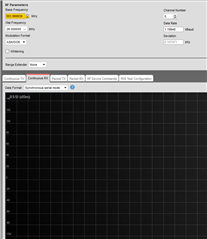Other Parts Discussed in Thread: TEST2
Tool/software:
Hi all! I have some conundrum with trying to receive my water meter packets using the chip.
This reference implementation for the protocol parser for RTL_433 seem to be dead easy to accomplish - https://github.com/NorthernMan54/rtl_433_ESP/blob/main/src/rtl_433/devices/neptune_r900.c
It is 912Mhz base freq, OOK modulation. The protocol itself is fixed-length ( 12 bytes ) packets
I got this register config via SmartRF
static const registerSetting_t preferredSettings[]=
{
{CC1101_IOCFG0, 0x06},
{CC1101_FIFOTHR, 0x47},
{CC1101_PKTLEN, 0x0C},
{CC1101_PKTCTRL0, 0x04},
{CC1101_FSCTRL1, 0x06},
{CC1101_FREQ2, 0x23},
{CC1101_FREQ1, 0x13},
{CC1101_FREQ0, 0xB1},
{CC1101_MDMCFG4, 0xCA},
{CC1101_MDMCFG3, 0x83},
{CC1101_MDMCFG2, 0x37},
{CC1101_MDMCFG1, 0x00},
{CC1101_DEVIATN, 0x35},
{CC1101_MCSM0, 0x18},
{CC1101_FOCCFG, 0x16},
{CC1101_AGCCTRL2, 0x43},
{CC1101_WORCTRL, 0xFB},
{CC1101_FREND0, 0x11},
{CC1101_FSCAL3, 0xE9},
{CC1101_FSCAL2, 0x2A},
{CC1101_FSCAL1, 0x00},
{CC1101_FSCAL0, 0x1F},
{CC1101_TEST2, 0x81},
{CC1101_TEST1, 0x35},
{CC1101_TEST0, 0x09},
};
I can confirm that the chip stays in RX mode, and yet I'm not receiving any interrupt on GDO0.
So far I verified that:
- the R900 signals are coming through ( using RTL_SDR dongle and same antenna )
- the frequency and modulation that is detected in the packets matches my RF settings ( or should match ).
What else am I missing?
Thank you!




